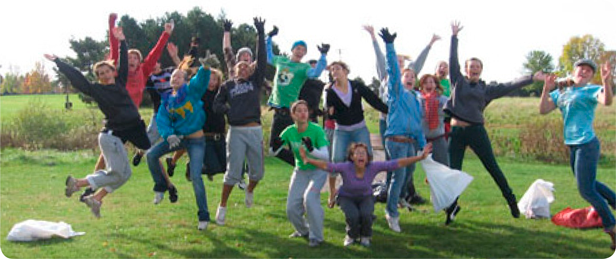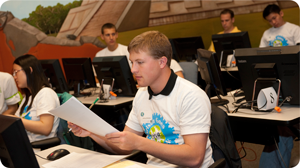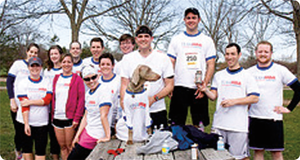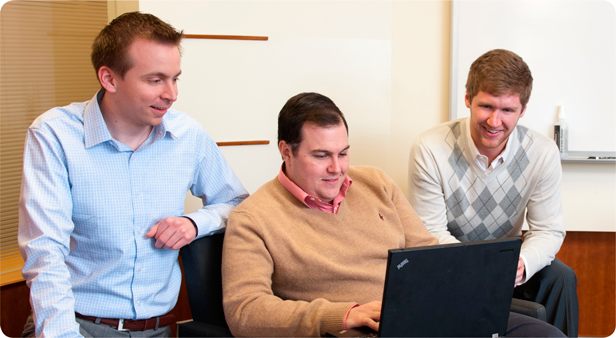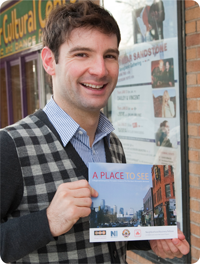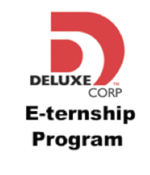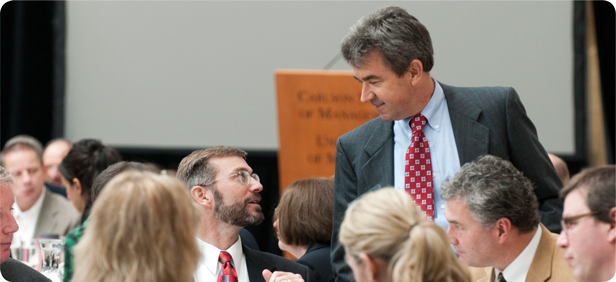
Carlson Reaching Out
Friday, April 1, 2011
The Carlson School helps its students forge close ties to the community through a wide range of outreach activities.
The Carlson School has long been known for its academic rigor, the high caliber of its graduates, and its close ties to the Twin Cities business sector. While those are all undeniably important elements of the business school experience, there’s more to the equation. The Carlson School also has a proud tradition of strongly encouraging its students and faculty members to be good neighbors—both to the local community and to the world at large. Here’s a look at some outreach activities that are the tangible results of that tradition.
Students Today Leaders Forever
During a late-night dorm room conversation in 2003, four University freshmen discussed how society needed young leaders committed to social change. From this small beginning, the independent organization Students Today Leaders Forever (STLF) was born. “Our communities, nation, and world need a generation of social activists passionate about change and willing to take action,” says STLF co-founder Irene Fernando, ’07 BSB.
STLF’s mission of revealing leadership through service, relationships, and action is accomplished in part through the Pay it Forward Tour—a multi-day, multi-city program focused on service, education, and reflection. Students travel by bus, volunteer in a new city each day, learn about social issues, and take part in leadership activities each night.
Today, STLF has a presence in 12 states on the college, high school, and middle school levels. To date, it has sent out 240 Pay it Forward Tours, which equates to 9,500 people contributing 115,000 hours of service to communities across the country.
STLF has a rigorous Leadership Training Program to equip college students to lead these experiences, as well as a Leadership Camp for high school students. “STLF’s greatest impact is through the lives of each of the people who are part of our program,” Fernando says. “These young people are energetic, civically responsible, and socially aware. They are yearning to contribute to the world.”
Net Impact
Net Impact is an international nonprofit with a mission to inspire, educate, and equip students and professionals to use business skills to build a more socially and environmentally sustainable world. It has a large presence at the Carlson School, thanks in part to the work of co-founders Tommy DeMarco and Amanda Donohue-Hansen. Donohue-Hansen is currently the president of the undergraduate chapter.
In its first two years of operation, the chapter has accomplished plenty, including Carlson Goes to Work, in which students, staff, and business professionals spend an afternoon conducting business-focused community service at local nonprofits. “We hope to continue to promote leadership and create events and partnerships that will transform volunteering and activism into a professional experience,” Donohue-Hansen says.
The Carlson School also hosts a Net Impact MBA chapter. “We aim to give students an outlet for their career and personal goals, beyond the functional tools that are part of the MBA experience,” says chapter president and MBA student Judd Eder. “We host activities and events to ensure that students’ interests are supported, be it a talk from a Medtronic energy manager or a talk on corporate social responsibility from Marilyn Carlson Nelson.”
The MBA chapter also runs the Neighborhood Business Fellows program, which focuses on helping spark the neighboring Cedar-Riverside community’s economy. The program is done in partnership with another MBA group, CHANCE, and is sponsored by State Farm Insurance. “By working with programs like the Neighborhood Business Fellows, which shares State Farm’s concern for healthy neighborhoods, we are able to contribute to helping the Cedar-Riverside neighborhood thrive,” says Missy Youmans, community relations zone strategist, State Farm Insurance. At present, the Fellows have conducted surveys and completed economic analyses and case studies. “We’re now working on the next step of the process, ensuring that the key learnings are translated into real impact on the community,” Eder says.
Graduate Volunteer Consultants
Twin Cities-area nonprofits have an ally in the Graduate Volunteer Consultants (GVC), an MBA and MA-HRIR student-run organization that offers free business consulting services. “Our first goal is to provide free, professional-level consulting services,” says GVC managing partner and MBA student Joe Mitchell. “The second is to tie learning to doing; the GVC experience offers the opportunity to contribute to the community and apply business skills and concepts.”
Students typically spend five to 10 hours per week on their consulting projects during a seven-week period in spring semester. “We also have a capstone celebration at the end of the term that allows clients and students to share their experiences and further the learning and application between students and nonprofits,” Mitchell says, noting that there are currently 70 students participating on 14 projects. “We’ve also talked about ways to further GVC’s reach through partnerships to help students get internships and board positions in the nonprofit community.”
Chance Neighborhood Partnerships
Founded in 2006, CHANCE (Cedar-Humphrey Action for Neighborhood Collaborative Engagement) aims to create partnerships between the University and the Cedar-Riverside community and to strengthen student engagement in the neighborhood.
CHANCE operates through the Center for Integrative Leadership, which is overseen by the Carlson School and the Hubert H. Humphrey School of Public Affairs. At the University, CHANCE is made up of individuals from the Carlson School, the Humphrey School, the University of Minnesota Law School, University Libraries, the Office of Public Engagement, and the Office of University Relations.
Morgan Zehner, ’10 MBA, and a CHANCE student leader, recently received the Outstanding Partner in Engagement award from the University’s Office of Public Engagement for his commitment to the University’s partnership with the neighborhood. Working with the Neighborhood Business Fellows Program, he recruited MBA students to interview regional entrepreneurs outside the Cedar-Riverside area to determine the perceptions and challenges of operating a business there. They’ve since compiled the interviews into a report and plan to host a forum for entrepreneurs, city officials, and others to discuss its findings.
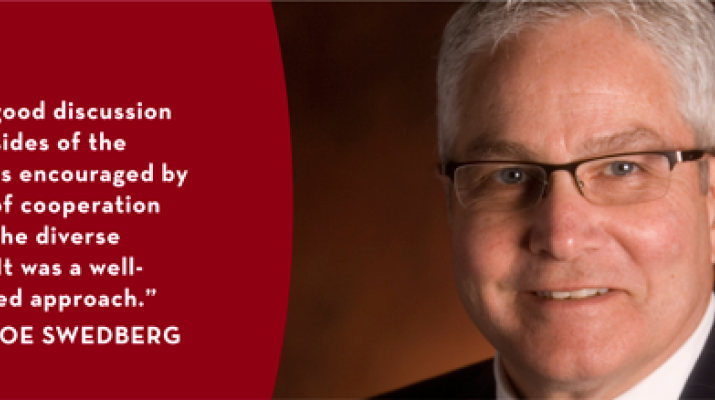
It was a good discussion about all sides of the issue. I was encouraged by the tone of cooperation between the diverse opinions. It was a well-constructed approach.
Finding Common Ground
Uniting diverse perspectives is the goal of the Finding Common Ground forums developed by the Center for Integrative Leadership and the Global Initiative for Food Systems Leadership (GIFSL).
GIFSL is affiliated with the University, and reports to the vice president of the Academic Health Center and the deans of the School of Public Health; College of Food, Agricultural and Natural Resource Sciences; and the College of Veterinary Medicine.
The first Finding Common Ground forum, which took place in November 2010, focused on antibiotics and agriculture. A broad selection of representatives from academia, media, government, and corporate firms such as Pfizer Animal Health, Gold’N Plump, Jennie-O Turkey, and Hormel were in attendance and offered their perspectives. “It was a good discussion about all sides of the issue,” says Joe Swedberg, Hormel’s vice president of legislative affairs. “I was encouraged by the tone of cooperation between the diverse opinions. It was a well-constructed approach.”
Deluxe Entrepreneur Internship Program
Teaming up with the Deluxe Corporation Foundation and the Buuck Family Foundation, the Carlson School’s Gary S. Holmes Center for Entrepreneurship allows students to work at some of Minnesota’s top entrepreneurial companies. The Deluxe Entrepreneurship Intern (E-ternship) Program pairs 20 undergraduate students each spring semester with early-stage companies to support the launch or creation of new ventures or services.
“There’s a natural connection between Deluxe’s mission of helping small businesses succeed and providing Carlson School students with opportunities to apply entrepreneurship coursework,” says Jenny Anderson, director of foundations and community affairs, Deluxe Corporation Foundation. “The Carlson E-ternships supported by this program are creating a pool of entrepreneurial talent that is benefiting our entire community.”
Companies participating in 2011 include Augeo Affinity Marketing, VAST Enterprises, Klick Real Estate, and Liberty Diversified Industries. The Holmes Center and the companies share the costs equally, enabling students to be compensated for their time. “We were impressed with several aspects of the e-ternship program, from providing paid on-the-job experience for students to helping them as they make career decisions,” Anderson says. “The Deluxe Foundation agreed to help endow the program so Carlson School interns could loan their talent and expertise to local companies for years to come.”
The Sustainability Initiative
Sustainability is a puzzle everyone is trying to solve these days. Several years ago, in its role as a bridge to academia and the corporate realm, the Institute for Research in Marketing at the Carlson School asked its advisory board about its key areas of interest. The board, comprised of marketing executives from Fortune 500 companies, expressed resounding interest in how marketing professionals could contribute to and influence the sustainability movement. “It is a clear priority for our members,” says Wayne Mueller, director of the Institute. “Companies want to know how to create demand for new products and how to influence the behavior changes necessary to make a difference.”
In response, Akshay Rao, founder of the Institute for Research in Marketing and the General Mills Chair in Marketing, launched the Sustainability Initiative, a multi-year research program to build the base of scholarship focused on the demand side of sustainability. “We found that 98 percent of sustainability funding is devoted to the creation of new products and processes, while less than 2 percent is spent on developing an understanding of how buyers can be persuaded to adopt new, environmentally friendly alternatives,” Rao explains. “This inattention could potentially affect the success rate of sustainability efforts for years.”
Last fall, the Institute kicked off the Sustainability Initiative with Carlson on Sustainability, a conference that brought together academics, practitioners, and policy makers from around the world to identify research problems in the sustainability movement. With partners that included the Center for International Business Education and Research (CIBER), the Institute on the Environment, the Center for Integrative Leadership, Wells Fargo, and Best Buy, the Institute engaged attendees for two days of rigorous and informative exchange. The agenda for the conference featured sessions that covered a range of topics, including “Doing Well While Doing Good,” and the “Sustainability Liability.”
Moving forward, the Institute plans to form a consortium of corporations, foundations, government agencies, and academic institutions that sponsors and conducts research on sustainability. “This community interface is necessary in order to keep our research meaningful for the practitioner community,” says Mueller.
